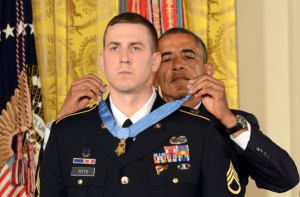I was watching the ABC Nightly News a few weeks ago when they ran a story on Medal of Honor recipient Ryan Pitts. During the segment, they mentioned that he was one of nine living recipients. There was footage of him with the President and of him standing at a podium, but nothing he said was broadcast. He had to go through an incredible ordeal in Afghanistan to get it and there was nothing from him. His words didn’t mean anything apparently.



Follow Me!